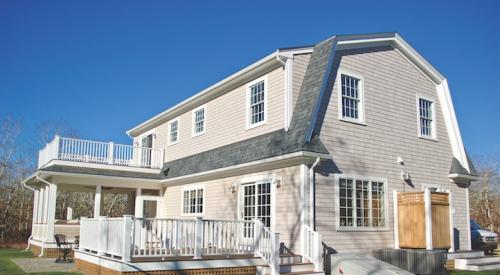| Under Massachusetts law, regional planners on Cape Cod are testing their power to declare building moratoriums within "districts of critical planning concern." Fearing a domino effect throughout the cape, local builders are working to reverse a moratorium in Barnstable. |
As vacationers flock to the beaches of Cape Cod, Mass., the climate for local builders has been anything but relaxed this summer.
In one of the largest towns, Barnstable, home building permits have slowed to a trickle because of a townwide moratorium on development that has been temporarily in place since March. It was then that regional planners used their powers to halt all development at the behest of town officials. Early next month, county legislators will determine if the building cap will be made permanent. If that happens, development will be haulted for two years during which time a long-term growth cap can be drafted and enacted.
The fear among builders, says Michael Cole, president of the Home Builders Association of Cape Cod, is that a domino effect could occur, with nearby towns requesting similar moratoriums from regional planners.
"I think that cases like this are going to start in resort areas like ours first, then march up and down the coasts and work their way inward," says Cole. The first local moratorium, he notes, was actually used a few years ago, just off Cape Cod on the island of Martha’s Vineyard.
Jamie Veara, an attorney representing the local HBA, says it is difficult to quantify the Barnstable action’s economic impact on area builders, but - backlogs are certainly shrinking.
"I think we’ll see the true impact hit six or eight months from now," says Veara, who has petitioned a local judge for a fast-track trial to reverse Barnstable’s moratorium and possibly prevent others.
While most local builders agree that Cape Cod is a unique place worthy of tight growth controls, the deeper issue is at what point planning restrictions become too onerous on landowners and perhaps unconstitutional.
Builder Liz Kovach, first vice president of the Cape Cod HBA, says builders everywhere should be concerned about the Barnstable case for two reasons. First, the normal planning process is short-circuited by relatively few individuals. In this case, the Barnstable town manager with the blessing of the town assembly asked for the building cap without prior public notice. Second, the result removes grandfathered protections of hundreds of property owners who must stand by and watch the market value of their property dissipate.
"The number one problem with [the moratorium] is that it can override grandfathered protections," Kovach says. "As many as 700 property owners are affected by this."
Since 1990, when the Massachusetts Legislature enabled the creation of regional planning authorities with broad power to control growth, the resulting Cape Cod Commission has been judicious in its use of this power, Cole says. In particular, the commission has been reluctant to employ a unique tool that allows it to halt all permitting within specified "districts of critical planning concern" or DCPCs. Until March, these zones were declared only in rare, targeted instances, most often to preserve wetlands.
But all caution seemed to go out the window when town officials in Barnstable and nearby Wellfleet requested and received preliminary DCPC moratoriums not for small, threatened areas but for the entirety of their towns. Wellfleet later dropped its request, but the situation in Barnstable is ongoing and in litigation.
Veara, with the firm of Zisson & Veara in Dennis, Mass., says the case against the Barnstable moratorium is being waged on the grounds that DCPCs were never intended to cover entire towns. He does, however, say the case could rise to the level of a Fifth Amendment violation of the takings clause, which requires governments to compensate owners for loss of property as a result of government action. A case was not filed on this basis because of the time it takes to get through federal courts. And, says Veara, "we hope to have a favorable outcome much sooner than that."
Stuart Meck, senior researcher for the American Planning Association, disagrees with Cole’s assessment that a domino effect could occur. "Moratoriums are still rare because local governments are still very nervous using them because of the legalities involved."
Additionally, says Meck, Arizona, California, Maine, Minnesota, New Hampshire, New Jersey, Oregon and Washington have strict laws governing the use of moratoriums. He says most moratoriums can be imposed only when a town’s growth has outstripped its basic capacity for services.
Margo Fenn, executive director of the Cape Cod Commission, says that was the case in Barnstable. "Barnstable has grown very quickly over the last couple of decades," Fenn says, "and there is a backlog of municipal infrastructure and municipal services. The DCPC designation allows a timeout to develop a building cap to address growth concerns."












